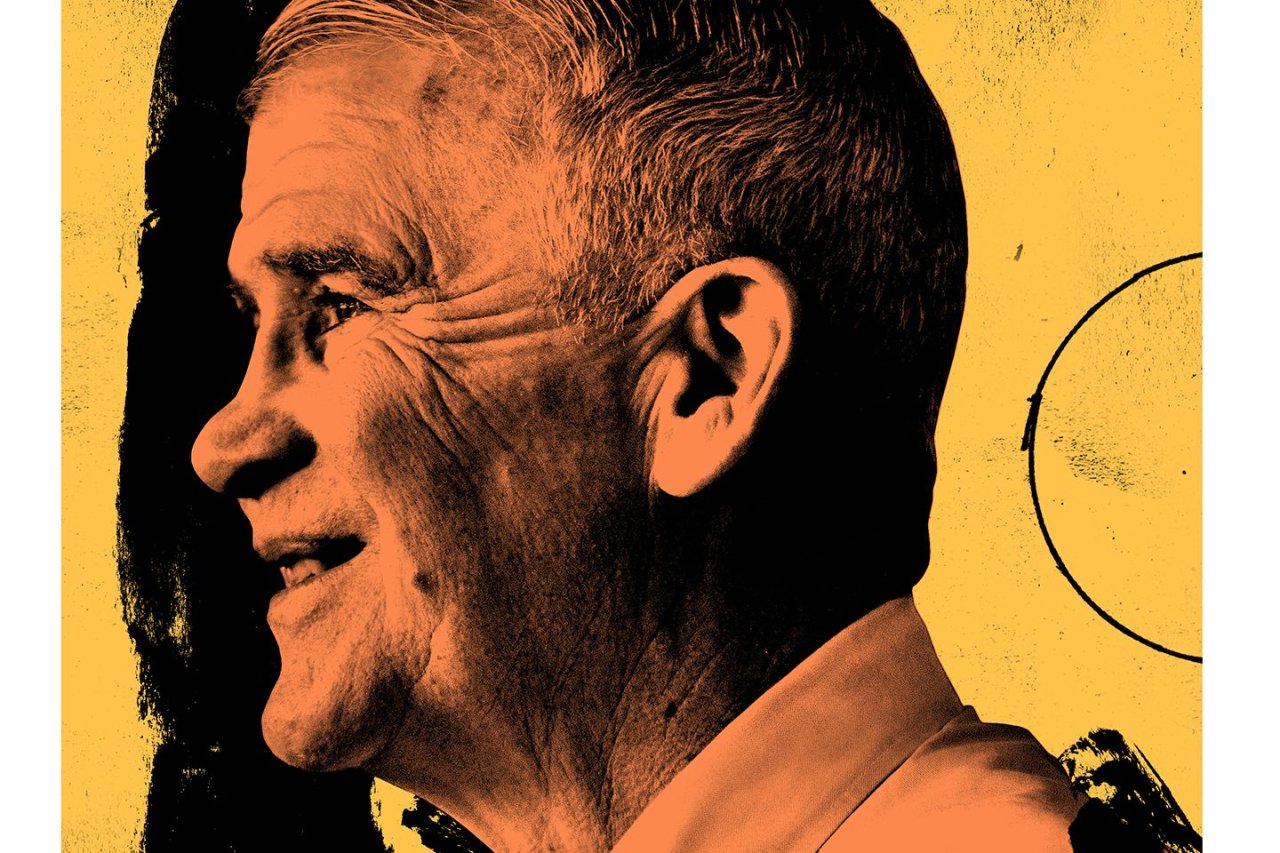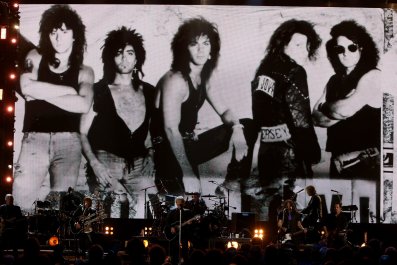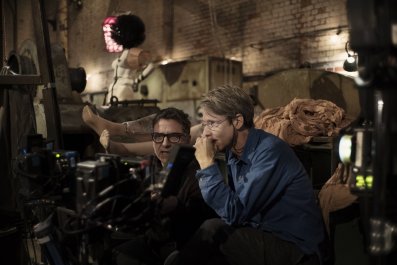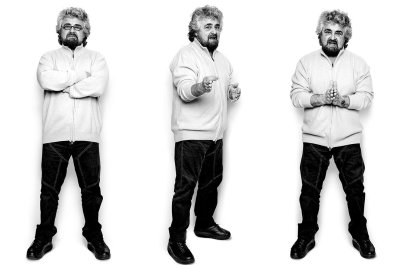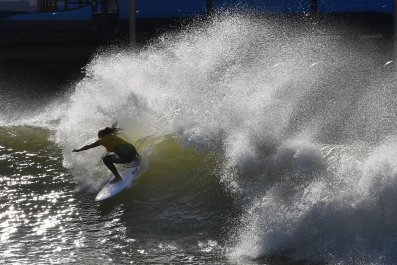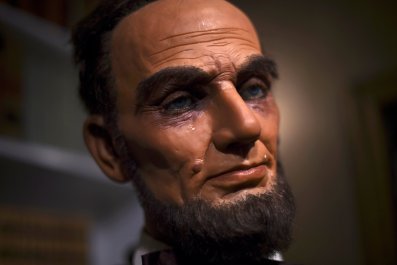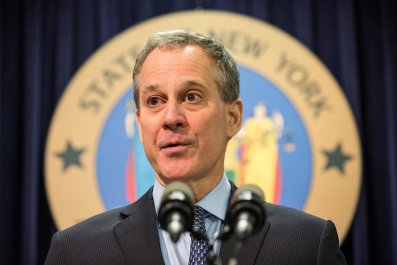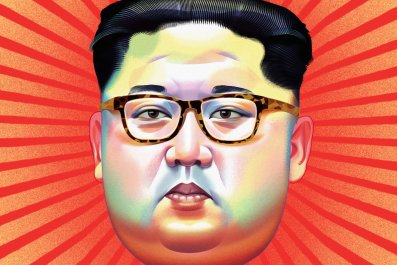Three decades ago, long before President Donald Trump bragged about the size of his inauguration crowd, Oliver North—the new president of the National Rifle Association—held the country in thrall with his own displays of dissembling and dishonesty, turning a fundamental disregard for facts into a political strength. As the Trump-Russia probe continues, North's rise, fall and return to national prominence offer some clear lessons, both for the president and his detractors.
A former Marine who served on the National Security Council (NSC) staff under President Ronald Reagan, North was at the core of the biggest political scandal of that era—the Iran-Contra affair. (He eventually was convicted on three criminal charges, although an appeals panel vacated the convictions on a technicality.) The scandal involved a bumbling series of covert ops in the mid-1980s centered on a scheme to sell U.S. missiles to Iran; the plot was to siphon the profits to Contra rebels fighting the Nicaragua's Communist government. Both were arguably illegal—certainly the perpetrators behaved as if they were—and violated official U.S. policies, not to mention basic spy-craft and common sense.
These were not rogue activities. As I explain in my book Iran-Contra: Reagan's Scandal and the Unchecked Abuse of Presidential Power, Reagan knew about most, though probably not all, aspects of these operations and pushed his staff to continue them. Even though the president understood he could be breaking the law, he never retreated from his overriding goals of bringing American hostages home from Lebanon and driving Communists out of this hemisphere.
North was Reagan's principal foot soldier in these dubious campaigns. As he organized weapons sales to the ayatollahs and secretly supplied support to the Nicaraguan rebels, he lied serially to virtually every group he encountered—those he was working against (notably the Iranians), those he cooperated with (including his own NSC staff colleagues and superiors) and those who wanted to know more about what he was doing (Congress and the press).
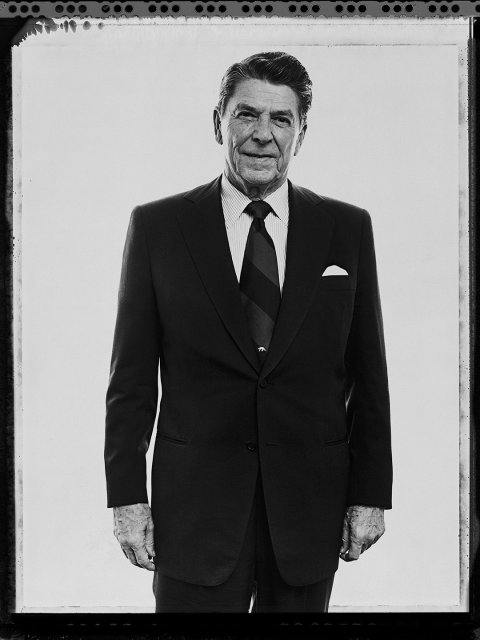
When both the Iran and Contra operations were exposed—within a month of each other in late 1986—his deceptions multiplied. He falsified official documents to throw investigators off track and shredded unknown quantities of evidence—all to evade Congress, the Justice Department and the administration-appointed independent counsel, Lawrence Walsh (a predecessor to Robert Mueller today).
None of these actions were out of the ordinary for someone caught breaking the law. But that changed in 1987 when a Democrat-controlled Congress held public hearings. Democrats on the joint investigating committees, some of whom were veterans of the Watergate proceedings, implicitly hoped for a reprise of that success—back when lawmakers faced down the imperial president and came away looking heroic. Instead, witness after witness challenged the committees, justifying their offenses on patriotic or ethical grounds, and showered North with maudlin tributes. His secretary, Fawn Hall, encapsulated their sense of righteousness by insisting there were times "when you have to go above the written law."
But it was North who offered the most remarkable—and brazen—performance. Appearing in his Marine uniform (in contrast to the gray suits of his interrogators), he confronted them with a combination of blunt admissions of misconduct and gushing loyalty to the flag and the president. One lengthy example captures his tone: a response to a question about why he thought Reagan had fired him from his White House job:
Let me just make one thing very clear, counsel. This lieutenant colonel is not going to challenge a decision of the commander in chief, for whom I still work. And I am proud to work for that commander in chief. And if the commander in chief tells this lieutenant colonel to go stand in the corner and sit on his head, I will do so. And if the commander in chief decides to dismiss me from the NSC staff, this lieutenant colonel will proudly salute, and say, "Thank you for the opportunity to have served" and go. And I am not going to criticize his decision, no matter how he relieves me, sir.
North's confessions were sometimes bizarre. At one point, congressional leaders asked him about a $14,000 security gate that an associate had installed for him at his home. North never paid for it, which made the project the equivalent of compensation, a federal crime for a government official to accept. North admitted he had ginned up two phony letters to the contractor to make it look as if he intended to pay. To make it all seem real, he went to a retail store to surreptitiously use a typewriter on display so the letters to the contractor could not be traced back to him. Then he used a file on the typewriter ball so they looked as if they had been written at different times.
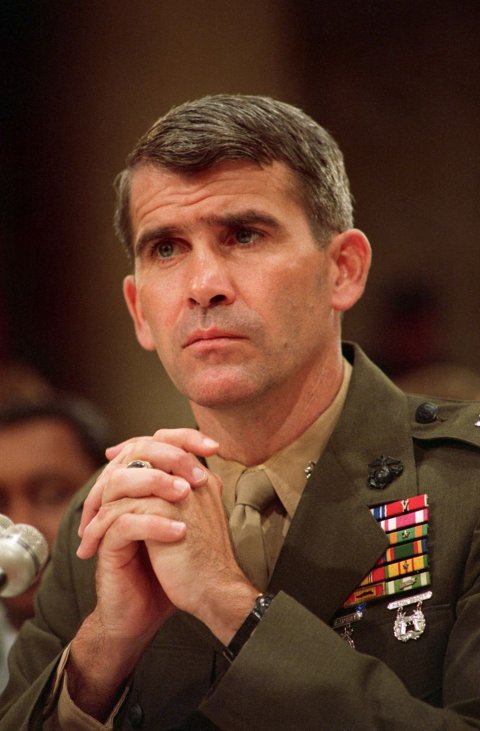
His shocking deceptions aside, North's admissions of more routine dishonesty ("I will tell you right now, counsel, and all the members here gathered, that I misled the Congress") somehow blunted the committees' attempts to catch him in a fresh lie. His remorseful schoolboy manner ("I want you to know lying does not come easy to me") exasperated his questioners, and his attitude—simultaneously boastful ("I lied every time I met the Iranians") and self-exculpatory ("I think we all had to weigh in the balance the difference between lives and lies")—regularly kept congressional leaders off-balance.
A prime objective for North and his attorneys, which they carried off to spectacular effect, was to portray his inquisitors as self-promoting Washington insiders—part of the swamp—and North as the selfless outsider unafraid to take them on.
Both sides, North's team and the congressional committees, understood the stakes. But North was far better at political theater, using props ranging from his chest full of medals to stacks of telegrams from fans (at his criminal trial, he sometimes used a Bible), plus a voice choked with emotion. Meanwhile, as Hollywood legend Steven Spielberg once pointed out, the questioners on their elevated dais unwittingly adopted the "villain's angle," gazing down at the witnesses and giving them the advantage of looking like victims, if not heroes.
The impact of North's weeklong appearance was extraordinary. Public outpourings of support for the lieutenant colonel—the press dubbed it "Olliemania"—stunned most committee members, who cringed when Capitol police lined up for photo ops with him. Thousands of telegrams, in the days before email, and phone calls to Congress in support of North cowed the majority into trimming back their aggressive approach. A few who had blasted North before his testimony cravenly reversed themselves and lionized him afterward. Emboldened Republican members ratcheted up their defense of Reagan and his administration, becoming protectors of the party instead of trying to discover the truth about what had happened and who was responsible.
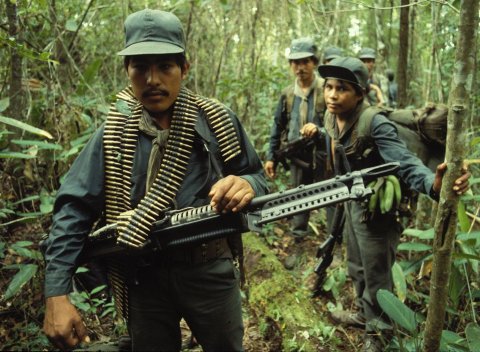
Years before candidate Trump startled the nation with his penchant for shameless fabrications and misrepresentations—PolitiFact found that nearly 70 percent of his campaign statements were "mostly false," "false" or "pants on fire"—North demonstrated that showmanship and performance could be far more effective than truth. Invoking traditional values like patriotism, or otherwise playing on popular emotions, exerted a magnetic pull on millions of Americans. It also exacerbated some of the same political divisions that exist today.
North's sizable group of followers—Ollie's Army, as they were called—was similar to Trump's faithful base. But North's later experiences may be instructive for the current president, as well as his personal lawyer, Michael Cohen, now under investigation. One is that the threat of prosecution can have a revelatory effect, even on the most devoted of aides. The minute jail time loomed as a real possibility for North, his role as loyal soldier quickly stopped. "I don't believe that any of those people [his superiors] foresaw the outcome of what has happened," North told Congress. "I do honestly believe that they expected that Ollie would go quietly, and Ollie intended to do so right up until the day that somebody decided to start a criminal prosecution."
Another lesson from North's travails is that a fanatical phalanx of loyalists may not always be enough. When the ex-NSC staffer put his legal troubles behind him and ran for the Senate from Virginia in 1994, a cohort of senior members of his party took out their pent-up anger against him for failing to stand by Reagan to the end. As a prominent GOP ex-congressman, Pete McCloskey, put it: "Oliver North's only absolute commitment is to himself and his ambitions. North wraps himself in the flag but betrays the republic for which it stands." Even Reagan lashed out at his former aide for his "false statements," writing in 1994, "I'm getting pretty steamed about the statements coming from Oliver North."
North's Senate bid fell short. He went on to a successful career at Fox News before setting his sights on leading the NRA. But he never tried to run for office again. He'd gone too far.
As Nancy Reagan, not one to forgive slights against her husband, once told a PBS audience, "Ollie North has a great deal of trouble separating fact from fantasy."
Much like Trump himself.
Malcolm Byrne is director of research at the nongovernmental National Security Archive at George Washington University and the author of Iran-Contra: Reagan's Scandal and the Unchecked Abuse of Presidential Power. The views expressed here are his own.


